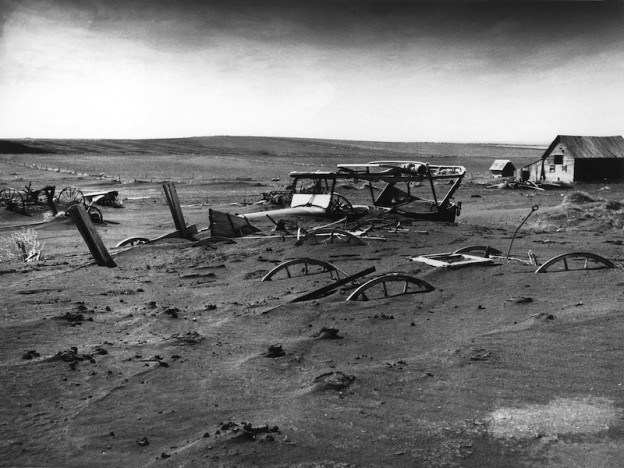

On the Fringe | Ash Land and Queen of Minneapolis
Ash Land: We can’t just wait for the rain.
Other critics (such as Matthew Everett and Ed Huyck) have waxed eloquent over Transatlantic Love Affair’s hauntingly beautiful physical theatre. Aesthetically, the show is superlative and worth seeing on its artistic merits alone. Thematically, Ash Land draws politically necessary parallels between the Dust Bowl and the New Normal. It’s this aspect of Ash Land that I want to explore.
Drought descends upon the community of Ashland, destroying farms and families alike. In one poignant scene, farmer Olson (Allison Witham) attempts to pay his mortgage with his remaining money. It’s not enough. As the bank teller begins the embarrassing process of telling Mr. Olson he’s short, the scion of the local banking family, James Craine (William Gambucci) quietly steps in. James returns Olson’s money with a handshake and the kind admonition to pay next month. James’s father, William Craine (Eric Nelson), quickly scolds him, telling him he’s got to “think like a businessman.”
It’s in moments like these that the critical aspects of Ash Land come to fore. James Craine is engaging in small-town mortgage modification, understanding that foreclosure on Ash Land’s farms will lead to empty land. Later, we learn that William Craine represents a kind of early vulture capitalism, urging his investors to buy up struggling family farms at rock bottom prices. Once the land starts producing again, Ashland’s one percent will have readymade factory farms. The parallels between the farm foreclosure crisis and our current home foreclosure crisis are clear. They reveal the kind of short-term thinking that’s led to Great Recession. Thinking “like a businessman” means going for profit now, and damn the consequences to your community.
The drought in Ash Land is caused not only by a lack of water, but a lack of communal spirit in community leaders. As news of 2012’s historic drought flashes across our screens nightly, we might do well to take in the lesson this beautiful, insightful production. Unlike the characters in the story, however, we can’t just wait for the rain. We’ll save the farm by learning to take better care of it ourselves.
Going Down on the Queen of Minneapolis: Administrative assistants run the world.
This is an idea Freshwater Theatre needs to revisit: collect the worst working world horror stories and turn them into a play. Going Down throws megalomaniacal bosses, neurotic middle managers, and exploited administrative assistants onto a river boat without a real captain. Let the high-speed come-apart commence!
As a commentary on white collar work, the show is dead on. Mystee (Katie Starks), the receptionist, is the only one in the entire office who really knows what’s going on. Not only is she the only one who can operate the copy machine, she is also the only one who is paying attention to the financial state of Nokomis Construction. Anyone who has worked in an office will immediately recognize this dirty secret of “skilled” labor: administrative assistants run the world.
The show moves a little too fast at times, and doesn’t allow us to really explore the full extent of Nokomis Construction’s fun dysfunction. Also, I didn’t get to know intriguing, important characters like Mila (Lacey Zeiler) and Angela (Ariel Leaf) as much as I would have liked. Thus does Fringe’s 60-minute time frame giveth and taketh away. Going Down is an enjoyable comedic critique of white collar work.
Thanks for your feedback. If we like what you have to say, it may appear in a future post of reader reactions.

